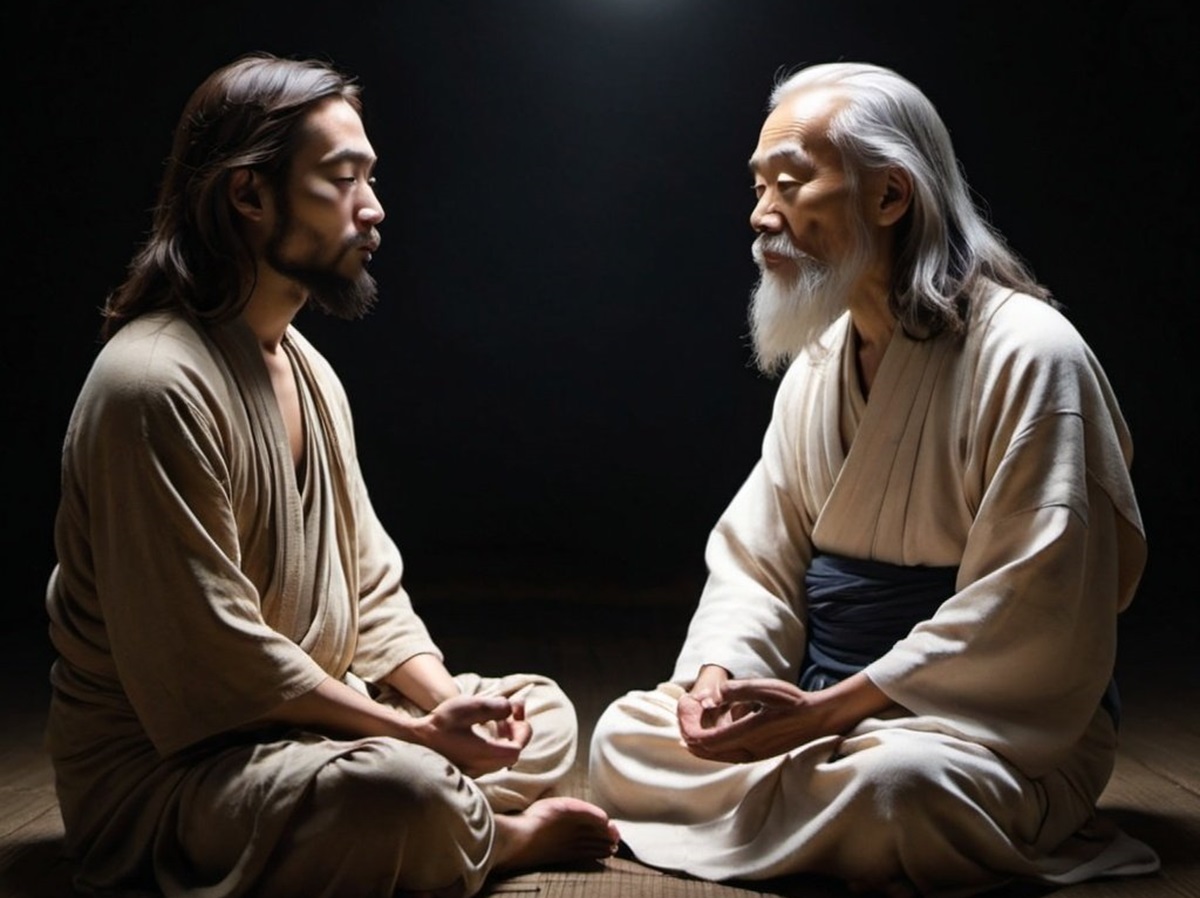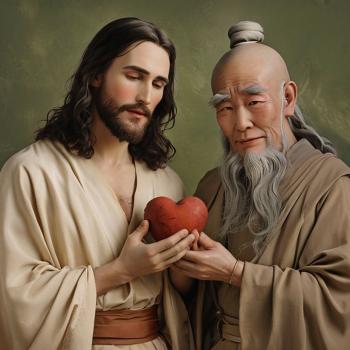Everyone has darkness in their soul. Instead of trying to drive out darkness, Jesus and Lao say there’s a mysterious virtue in nurturing it.

There’s a mysterious virtue hidden in the Tao Te Ching. This Chinese word for “virtue” is more than simple goodness. Instead, Te means a way of being that is full of harmony and authenticity. This verse explores how to live with such a virtue. Jesus and Lao Tzu agree that to nurture this virtue, you must turn inward into your own soul.
Lao Tzu’s “Tao Te Ching,” Verse 10—J.H. McDonald Translation
Nurture the darkness of your soul
until you become whole.
Can you do this and not fail?
Can you focus your life-breath until you become
supple as a newborn child?
While you cleanse your inner vision
will you be found without fault?
Can you love people and lead them
without forcing your will on them?
When Heaven gives and takes away
can you be content with the outcome?
When you understand all things
can you step back from your own understanding?Giving birth and nourishing,
making without possessing,
expecting nothing in return.
To grow, yet not to control:
This is the mysterious virtue.
Nurturing the Darkness of Your Soul
“Nurture the darkness of your soul until you become whole,” says the first line. The Christian reader might shrink back, mistakenly identifying this darkness of the soul as sin. Taoism has no such concept. Instead, think of darkness as Yin. In Taoism, Yin represents obscurity, intuition, contraction, softness, receptivity, contemplation, and the feminine. Nurturing the Yin of one’s soul means turning inward. It means, as Jesus said, going into your inner chamber. Often, we close our eyes in prayer to facilitate the darkness of the soul. It minimizes distraction and puts us in touch with our inner voice. The only way to become whole is by turning off the outer world and looking within.
Turning Inward
Stephen Mitchell translates the next line: “Can you coax your mind from its wandering and keep to the original oneness?” Gia-Fu Feng renders it as: “Carrying body and soul and embracing the one, can you avoid separation?” This is all about turning inward, listening to the still, small voice, and being still enough to know the heartbeat of God.
Becoming Like a Child
“Can you focus your life-breath until you become supple as a newborn child?” Lao Tzu asks. This focused breathing is one meditation technique that will allow the practitioner to soften their spirit and become receptive, like a child. Jesus said, “Truly I tell you, whoever does not receive the kingdom of God as a little child will never enter it.” A child is simple, uncomplicated, and trusting.
In Western thought, we often describe a newborn child as a tabula rasa or blank slate. The idea is that the child’s mind is like an empty chalkboard upon which nothing is yet written. Everything is potential. Taoism uses a similar metaphor, the concept of Pu, or the uncarved block. Just as the blank slate could become anything, the uncarved block holds infinite possibilities within itself. It’s not until the carver applies knife to wood that the uncarved block loses its potential and starts to become only one thing. When Lao Tzu and Jesus talk about becoming like a child, this is what they mean—returning to a state of pure unjudgmental potential.
Cleansing Your Inner Vision
Lao Tzu asks, “While you cleanse your inner vision will you be found without fault?” Again, the Christian reader may tend to superimpose the idea of sin/fault and faultlessness/righteousness upon this line. Yet, for the Taoist, it is not about God finding you sinless. Instead, it is about becoming whole. You do this by cleansing the inner vision. In Luke 11:34-36, Jesus says:
Your eye is the lamp of your body. If your eye is healthy, your whole body is full of light, but if it is unhealthy, your body is full of darkness. Therefore consider whether the light in you is not darkness. But if your whole body is full of light, with no part of it in darkness, it will be as full of light as when a lamp gives you light with its rays.”
Here, Jesus uses the eye as a metaphor for the soul’s inner vision. If the soul’s inner vision is cleansed, then the whole body is full of divine energy, or Chi (Qi). Chi is the life force that flows through all things. When the inner eye sees with clarity, the right action follows. This fills the entire being with holy light.
Loving People Without Forcing Them
Lao Tzu asks, “Can you love people and lead them without forcing your will on them?” This is the way that Jesus loved and led during his ministry on earth. Unfortunately, this is quite different from the way many followers of Jesus have exercised leadership throughout the centuries. Historically, Christian religious and political leaders have often employed violence to force their will on other people. This is not the way of Jesus. Jesus leads by gentle influence, not by power and coercion. Followers of The Way must do the same.
Being Content with the Outcome
The Tao Te Ching asks, “When heaven gives and takes away, can you be content with the outcome?” Like the biblical character Job, can you experience calamity and still respond, “Naked I came from my mother’s womb, and naked shall I return there; the Lord gave, and the Lord has taken away; blessed be the name of the Lord?” Like Jesus anticipating his crucifixion, can you say, “Father, if you are willing, remove this cup from me, yet not my will but yours be done?” Job and Jesus expressed the kind of contentment that is based on trust that heaven knows the Way. Even if it is unpleasant, this kind of faith knows that Heaven’s Way is full of love. The path of Christ calls every believer to this same mysterious virtue.
Stepping Back from Your Understanding
The Tao Te Ching says, “When you understand all things, can you step back from your own understanding?” Can you do as the author in Proverbs recommends? He says, “Trust in the Lord with all your heart, and do not rely on your own insight. In all your ways acknowledge him, and he will make straight your paths.” This does not involve a mindless acquiescence. It is trust rather than submission.
Giving Birth and Nourishing
The life of faith involves giving birth and nourishing. It is making without possessing, expecting nothing in return. This spirituality is about becoming generative yet holding loosely to that which you have created. It is growing, without needing to control. To illustrate this principle, Jesus told a story about a farmer who planted seeds in his field.
“Listen! A sower went out to sow. And as he sowed, some seeds fell on a path, and the birds came and ate them up. Other seeds fell on rocky ground, where they did not have much soil, and they sprang up quickly, since they had no depth of soil. But when the sun rose, they were scorched, and since they had no root, they withered away. Other seeds fell among thorns, and the thorns grew up and choked them. Other seeds fell on good soil and brought forth grain, some a hundredfold, some sixty, some thirty. If you have ears, hear!”
The parable of the sower perfectly illustrates the way a Taoist sage does their work without attachment to the outcome. It appears as if the farmer sows indiscriminately, without regard for intentional planting in good soil. The agrarians in Jesus’s audience would have heard the humor in Jesus’s story. What planter throws seed on the roadway? Or on rocky ground? Or in thorns? How foolish the Tao is, and how foolhardy those who follow the Way! Yet, those seeds that fell on good soil yielded thirty, sixty, and a hundredfold!
The Mysterious Virtue
When we learn to grow, without controlling others, this is the Mysterious Virtue. This is the Te of Christ. This indiscriminate planting is our way of loving people and trusting God to lead them, without forcing our way on them. We simply share the truth and rely on God for the outcome. This helps us to step back from our understanding. It allows us to abandon the need to be right. We are simply scatterers of seed, allowing God to give the increase.
Something to Pray…
Eternal essence of darkness as well as light, I take this moment to do as Jesus said. I go into the inner chamber of my heart. Free from the distraction of all the things that light calls attention to, I nurture this Yin aspect of my soul. As the waters of pre-creation were dark, formless, and void, so I make my heart receptive. Help me to become like a little child, a blank slate, and an uncarved block. Cleanse my inner vision so I can love people without forcing or controlling them. Help me to be content, no matter the outcome. May I be willing to step back from my own understanding of things. Make me fertile, so that I may give birth to and nurture this mysterious virtue in my own life, and in the lives of others.














